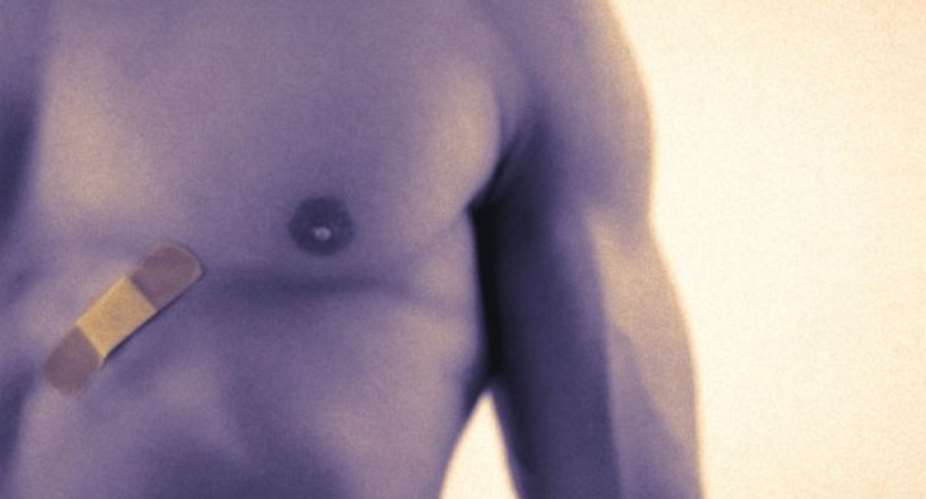Dr Augustine Benedict Ackon, Medical Director at the Bethel Methodist Medical Center in Takoradi, has said breast cancer is not associated with people "assigned male" at birth but can occur in rare instances at any age.
“Breast cancer is possible in men, but rare with a lifetime risk of one in 833. The risk of men getting breast cancer is about 70-90 times less than women. However, if men get breast cancer, the outcome is generally worse”, he pointed out.
Dr Ackon who made this known in an interview with the GNA said many people did not realize that people assigned males at birth have breast tissue too, and those cells could undergo cancerous changes since male breast cells were much less developed than female breast cells.
He said most common symptoms of breast cancer in people assigned male at birth is a lump in the breast tissue with other symptoms like thickening of the breast tissue, nipple discharge, redness or scaling of the nipple, a nipple that retracts or turns inward and unexplained redness, swelling, skin irritation, itchiness, or rash on the breast
According to him, most men do not regularly check their breast tissues for signs of lumps and for that matter male breast cancer was diagnosed much later which may be too late for treatment.
He however said "having one or more of these symptoms does not mean you have breast cancer, nipple discharge for example, can also be caused by an infection hence the need to see your doctor for a complete evaluation if you experience any of these signs and symptoms".
When asked whether treated breast cancer could recur, he said despite initial treatment and success, breast cancer could sometimes come back, known as “recurrence” which happens when small number of cells escape the initial treatment.
He explained that symptoms of a recurrence in the same place as the first breast cancer were similar to symptoms of the first which included; a breast lump, changes to the nipple, redness or swelling of the breast, and a new thickening near the mastectomy scar.
Dr Ackon explained that if breast cancer comes back regionally, it means that the cancer had returned to the lymph nodes or near to original cancer, but not the same place while the symptoms may be slightly different.
He emphasized that symptoms of a regional recurrence may include; lumps in the lymph nodes or near the collarbone, chest pain, pain or loss of sensation in the arm or shoulder and swelling in one's arm on the same side as the original breast cancer.
He stressed, “If you've had a mastectomy or other surgery related to breast cancer, you might get lumps or bumps caused by scar tissue in the reconstructed breast. This isn't cancer, but you should let your doctor know about them so they can be monitored.”
GNA





 Lay KPMG audit report on SML-GRA contract before Parliament – Isaac Adongo tells...
Lay KPMG audit report on SML-GRA contract before Parliament – Isaac Adongo tells...
 Supervisor remanded for stabbing businessman with broken bottle and screwdriver
Supervisor remanded for stabbing businessman with broken bottle and screwdriver
 NDC watching EC and NPP closely on Returning Officer recruitment — Omane Boamah
NDC watching EC and NPP closely on Returning Officer recruitment — Omane Boamah
 Your decision to contest for president again is pathetic – Annoh-Dompreh blasts ...
Your decision to contest for president again is pathetic – Annoh-Dompreh blasts ...
 Election 2024: Security agencies ready to keep peace and secure the country — IG...
Election 2024: Security agencies ready to keep peace and secure the country — IG...
 People no longer place value in public basic schools; new uniforms, painting wil...
People no longer place value in public basic schools; new uniforms, painting wil...
 'Comedian' Paul Adom Otchere needs help – Sulemana Braimah
'Comedian' Paul Adom Otchere needs help – Sulemana Braimah
 Ejisu by-election: Only 33% of voters can be swayed by inducement — Global InfoA...
Ejisu by-election: Only 33% of voters can be swayed by inducement — Global InfoA...
 Minority will expose the beneficial owners of SML, recover funds paid to company...
Minority will expose the beneficial owners of SML, recover funds paid to company...
 Prof. Opoku-Agyemang has ‘decapitated’ the NPP’s strategies; don’t take them ser...
Prof. Opoku-Agyemang has ‘decapitated’ the NPP’s strategies; don’t take them ser...
